A new direction for China
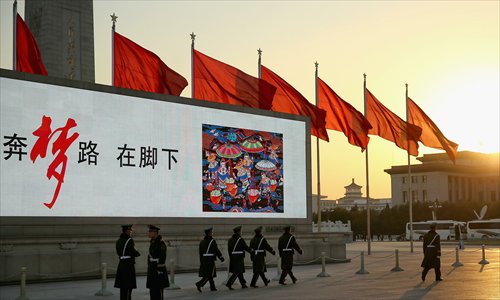
Red flags billow outside the Great Hall of the People in central Beijing where the Communist Party of China Central Committee gathered for a plenum on November 12. Photo: CFP
Editor's Note
2013 has been a transitional year for China. The just concluded Third Plenum of the 18th CPC Central Committee raised great hopes for China's reform in the following decade. Hotly discussed topics such as rule of law, national security and economic transformation are new catalysts to be explored. With such broad aims as its focus, the meeting requires specific and professional interpretations from experts.
Themed "Powerful reform in China, uncertainties remain in the Asia-Pacific region," the Global Times' 2014 conference held on December 7 focused on these issues, inviting more than 100 renowned scholars and 200 entrepreneurs and media professionals. In its first session, eight renowned experts shared their thoughts on the blueprint for China's future reform. More sessions will be featured in the Op-Ed section in the coming days.

Jiang Shigong, Professor and director of the Center for Law and Politics Studies at Peking University Law School
Discussions are still continuing after the conclusion of the Third Plenum of the 18th CPC Central Committee. People are eager to learn the most important signs from the meeting, but different people in various spheres can hear diverse things. In my opinion, it is rule of law that will be given the most important focus in future.
Rule of law is the philosophy that has reflected the strategic thought of this plenum. For example, when talking about the relationship between the government and the market, the concluding report of the meeting stresses that market entities are allowed to do whatever laws have no regulations on. This thought has never been accepted in the old philosophy of governance.
There is no doubt that rule of law is the foundation of a judicial system, but it is also critical for public administration. China is proposing the building of a modern system of government administration, which cannot succeed without rule of law. This philosophy must be included within the ideology of Chinese governance, which can put forward a fundamental transformation of China's political system, especially the establishment of constitutionalism.
This transformation should focus on how to re-orientate the relationship between the ruling party and the nation within the framework of the constitution. The relationship demands that the country build up a new model of constitutionalism - a CPC-led constitutionalism.
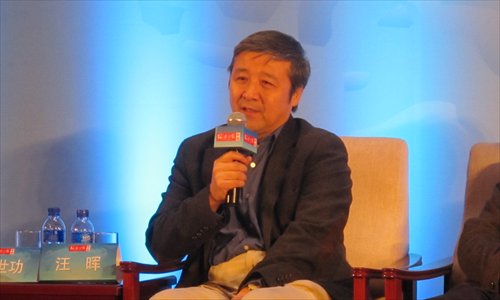
Wang Hui, Professor of Chinese language and literature, Tsinghua University
The Decision on Major Issues Concerning Comprehensively Deepening Reforms (The Decision) approved by the Third Plenum of the 18th CPC Central Committee emphasizes two points: the modernization of the state governance structure and the decisive role of the market in resource allocation.
As a detailed framework covering the country's development direction and profound reforms in various fields, in a traditional sense it shouldn't be mapped out by a party. However, in China, the Decision is even more comprehensive and significant than the report on the work of the government. This reminds us to dwell on one problem: the changing relationship between the Party and the State, which I call "nationalization of the Party."
Currently, China's basic political framework remains the same, and we have to carry out the most comprehensive reforms under the framework.
The Decision highlights both the function of the market and government, pointing out that the market will go from playing a basic role to a decisive role. I think it means the elimination of monopoly, liberalization of market access, and making the maximum use of market rules. But I am afraid the market cannot have the final say in areas such as ethnic policies, education and so on. Scholars have to further discuss how to define the decisive role of the market in the future.
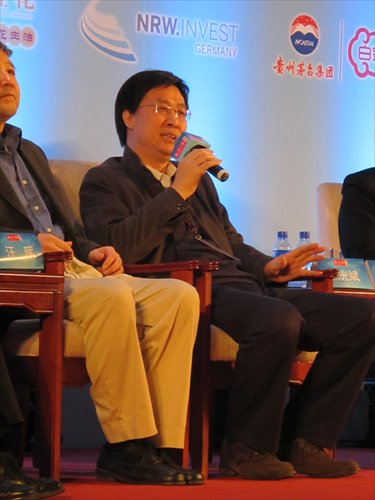
Yang Guangbin, Director of the Institute of Comparative Politics, Renmin University of China
It's widely viewed that the reforms outlined in the Decision are social and economic reforms. However, I hold they are mainly political ones. Politics not only refers to the Party and government, but also changes in society caused by technological and economic development. For example, the development of the Internet has brought revolutionary changes to China's political ecology.China's academic circle of political studies is excited that the modernization of the state governance system has been written into the Decision. But how should we understand it? In my opinion, the modernization of the state governance system means building limited government.
Our emphasis on the decisive role of the market and economic reform is in fact limiting the power of the government. It will be disastrous if power won't be restrained. China's ongoing reform has been characterized by a change of government functions, the construction of the Shanghai Pilot Free Trade Zone, and the anti-corruption campaign. All these in essence are restraining governmental behavior.
China has now established a leading group in comprehensively deepening reforms that is not confined to the interests of certain departments, and will be responsible for a wide range of reforms including economic and administrative ones. These will change China's political ecology and limit the government's power.

Farzam Kamalabadi, Senior vice president of the Bright Oceans Corporation
Mankind has experienced three regional phenomena since ancient times that have significant importance for the world. The first is the discovery of the American Continent and the second is the European Renaissance. The third, which will change the destiny of people all over the world, is China's reforms and integration into the world.This process has two impacts, both external and internal. Ideally, China should be able to turn the internal impact into an external impact, that is, to develop from an importer, imitator and learner to a contributor, leader and a guide in values. China not only has the advantage in the fields of economy, politics and military, but also can influence the world through its culture and values instead of solely being influenced by the world. Meanwhile, China should enable the world to believe China's peaceful rise does no harm to the world. Instead, it will contribute to the world.
Speaking of domestic impact, I think China's integration into the world will propel the mechanism of the country to become more transparent and fair with less government interference. The government can inject more influence into building thoughts and ideologies while loosening its control on State-owned companies and company registration. China can have its free trade areas, which I think is the country's second chance for reform and opening-up.
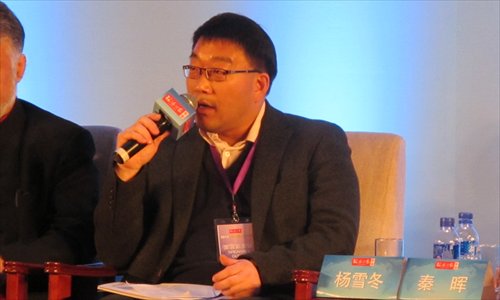
Yang Xuedong, Research fellow at the Central Compilation and Translation Bureau
The Decision shows that China's politics has become more accessible to ordinary people.First, China's past reforms were led by the Party to allow the people to live prosperous lives, while now it is the whole of society that pushes the Party and the country to make progress. This is the normal procedure, as the development of any society should start with its economic development, followed by political changes at the very top level.
Second, we can feel that the Decision represents the wishes of not only those who drafted it, but also of every individual. It means society is becoming mature and can pass on the wisdom of ordinary people to decision-makers.
Third, Chinese President Xi Jinping announced the Decision with very bold words, and this document has fewer ideological overtones than past papers, which shows the country and the Party are trying to adapt to our social development.
Last but not least, the growing process of China's current leadership and the country's reform and opening-up which started in 1978 are taking place simultaneously. It makes them feel more responsible for the country's development and have more courage to be bold and determined.
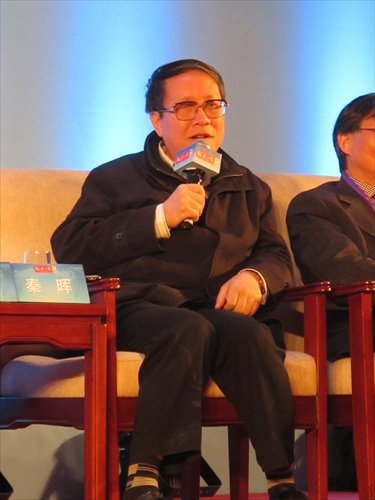
Qin Hui, Professor at Department of History under School of Humanities, Tsinghua University
The Decision leaves people the impression that it focuses on economic reform, but in fact it also includes rich content in the non-market field.The "decisive" role of the market is stressed, but the definition of what constitutes a "decisive" role remains vague. Compared with the US economy, the Hong Kong economy enjoys a higher level of liberty. But at the same time, Hong Kong has no less socialist elements than the Chinese mainland.
For instance, Hong Kong has a public healthcare system that covers anyone with a Hong Kong identification card, and a relatively fair education system. It is interesting that previously people migrated to Hong Kong for economic opportunities, but today mainlanders go there mainly for the socialism. They want to enjoy the social security and public welfare there.
China's future direction is actually decided by measures taken in the non-market field - how to expand public welfare, promote social equality, and prioritize public interests. Only by doing these things can China truly develop a socialist market economy. We should increase government responsibilities to supplement the role of the market.
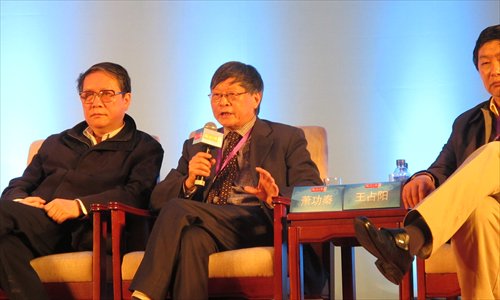
Xiao Gongqin, Professor at School of International and Public Affairs, Shanghai Jiao Tong University
Government-led modernization inevitably gives way to the emergence of vested interest groups, corruption, and a huge wealth gap.Due to the emergence of these problems, both ultra-leftist and ultra-rightist thoughts have emerged in China in recent years. Both seek to change China's existing political order through extreme ways - the former via means like the Cultural Revolution (1966-76), whereas the latter appeal for things like the Jasmine Revolution. Both have a certain social mobility capability and a certain effect.
The Chinese leadership has rationally realized that China must overcome this problem through a new round of reforms. China's new reform, initiated after the Third Plenum of the 18th CPC Central Committee, aims at systemic development prioritizing the needs of society, not the State.
In the next few years, both ultra-leftist and ultra-rightist thoughts will be marginalized, and the consensus held by the central camp may dominate society. The development of such a consensus will be a very important prerequisite for a democratic system with Chinese characteristics.
The past 34 years of reform were seen by the West as Version 1.0 of new authoritarianism. I think the following reform, which aims to build a more mature market economy, could be seen as Version 2.0 of new authoritarianism. These two versions can help China avoid radical problems that have emerged in many other countries during their transitional period. Drastic reform under steady political conditions means China will see a soft landing in its democratic system.
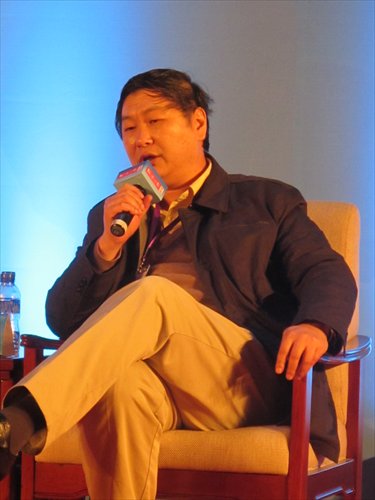
Wang Zhanyang, Professor at the Central Institute of Soclialism
There are three new features in the Third Plenum of the 18th CPC Central Committee.
First, the plenum has redefined socialism with Chinese characteristics, which, in Deng Xiaoping's words, is actually different from that of the Soviet Union as opposed to the political system of the US. China's socialist development takes a modernization-oriented, world-oriented and future-oriented objective through reform and opening-up that attaches importance to modernization, which is a general law of the world at large. This is a return to China's world-oriented socialism.
The plenum this year has endowed a new meaning to the socialist market economy by stressing it is a general law of market economy that the market should play a decisive role in allocating resources and pointing out that the core of economic system reform lies in managing relations between the government and market. Only by integrating socialism that creates happiness for people and a market economy which brings wealth will we enjoy equality, democracy and rule of law in society. And the government will work where the market fails by providing social security and civil rights.
Third, the Third Plenum reinitiated reform of the political system associated with the "new authoritarianism" that was first put forward in 1979. The reform has helped advance decentralization, for example, on the relations between the central and local governments, by referring to reasonable factors in the federal system in the West.